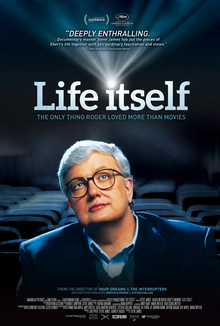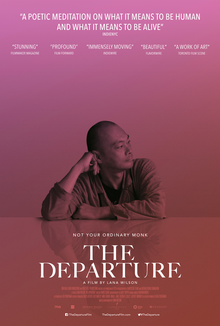| Saving Brinton | |
|---|---|
| Directed by |
|
| Starring | Michael Zahs |
| Cinematography | John Richard |
| Music by | Michael Kramer |
Production company | Barn Owl Pictures |
Release dates |
|
Running time | 87 minutes |
| Country | United States |
| Language | English |
Saving Brinton is a 2017 American documentary film about the efforts of Iowa resident Mike Zahs to preserve a large quantity of reels of film from the late 19th and early 20th centuries that he found in the basement of a farm house. [1] It premiered at AFI Docs on June 17, 2017 and internationally at the International Film Festival Rotterdam. Ann Hornaday of The Washington Post calls it one of 2018's "best movies of the year". [2] It was directed by Tommy Haines and Andrew Sherburne. [3]
In a farmhouse basement on the Iowa countryside, eccentric collector Mike Zahs makes a remarkable discovery: the showreels of the man who brought moving pictures to America's Heartland. Among the treasures are a rare footage of President Teddy Roosevelt, the first moving images from Burma, and a lost relic from magical effects godfather Georges Méliés. These are the films that introduced movies to the world. The old nitrate reels are just some of the artifacts that belonged to William Franklin Brinton. From thousands of trinkets, handwritten journals, receipts, posters and catalogs emerges the story of an inventive farmboy who became a barnstorming movieman. As Mike uncovers this hidden legacy, he begins a journey to restore the Brinton name that leads to The Library of Congress, Paris and back for a big screen extravaganza in the same small-town movie theater where Brinton first turned on a projector over a century ago. The State Theatre in Washington, Iowa, USA, which opened on 14 May 1897 is the world's oldest continuously operating cinema theatre.
Wesley Morris, critic-at-large for The New York Times , calls the film "celebratory... poignant" and that "the average documentary would gawk. This one reclassifies" [4] Pamela Hutchinson of The Guardian depicts the film as an "absorbing, heartwarming tale" and that "there’s genuine warmth to the documentary." [5] Kenneth Turan of the Los Angeles Times praises the film as "endearing, affectionate" and that "zealots are plentiful in the film history world, but ones as amiable as Zahs are as rare as the movies he doggedly preserved." [6] The Washington Post film critic Ann Hornaday describes the film as "an audience favorite at AFI Docs" and as "a revelatory homage not just to film as a constantly evolving art form, but also as a fulcrum for community." [7]

Primary is a 1960 American direct cinema documentary film about the 1960 Democratic Party primary election in Wisconsin between John F. Kennedy and Hubert Humphrey, part of their quest to be chosen as the United States Democratic Party's candidate for President of the United States in the general election.

AFI Silver Theatre and Cultural Center is a three-screen movie theater complex in downtown Silver Spring, Maryland, north of Washington, D.C. It is operated by the American Film Institute.

Fuck is a 2005 American documentary film by director Steve Anderson about the word "fuck". The film argues that the word is an integral part of societal discussions about freedom of speech and censorship. It examines the term from perspectives which include art, linguistics, society and comedy, and begins with a segment from the 1965 propaganda film Perversion for Profit. Scholars and celebrities analyze perceptions of the word from differing perspectives. Journalist Sam Donaldson talks about the versatility of the word, and comedian Billy Connolly states it can be understood despite one's language or location. Musician Alanis Morissette comments that the word contains power because of its taboo nature. The film features the last recorded interview of author Hunter S. Thompson before his suicide. Scholars, including linguist Reinhold Aman, journalism analyst David Shaw and Oxford English Dictionary editor Jesse Sheidlower, explain the history and evolution of the word. Language professor Geoffrey Nunberg observes that the word's treatment by society reflects changes in our culture during the 20th century.

The AFI Docs documentary film festival was an American international film festival. Created by the American Film Institute and the Discovery Channel, it was held annually in Silver Spring, Maryland and Washington, D.C., from 2003 to 2022, when it was merged into AFI Fest, a Los Angeles-based film festival.

Kirsten Johnson is an American documentary filmmaker and cinematographer. She is mostly known for her camera work on several well-known feature-length documentaries such as Citizenfour and The Oath. In 2016, she released Cameraperson, a film which consists of various pieces of footage from her decades of work all over the world as a documentary cinematographer. Directed by Johnson herself, Cameraperson went on to be praised for its handling of themes about documentary ethics interwoven with Johnson's personal reflection on her experiences.

Northland Films Inc. is an independent documentary film production company. The Midwest-based crew has produced award-winning documentary films that have been featured in The New York Times, The Guardian, Los Angeles Times,Variety, The Hollywood Reporter and on ESPN and NBC Sports.

This Is Not a Film is an Iranian documentary film by Jafar Panahi and Mojtaba Mirtahmasb. It was released on 28 September 2011 in France, distributed by Kanibal Films Distribution.

Life Itself is a 2014 American biographical documentary film about Chicago film critic Roger Ebert, directed by Steve James and produced by Zak Piper, James and Garrett Basch. The film is based on Ebert's 2011 memoir of the same name. It premiered at the 2014 Sundance Film Festival and was an official selection at the 67th Cannes Film Festival. The 41st Telluride Film Festival hosted a special screening of the film on August 28, 2014. Magnolia Pictures released the film theatrically in the United States and simultaneously via video on demand platforms on July 4, 2014.

The Square is a 2013 Egyptian-American documentary film by Jehane Noujaim, which depicts the Egyptian Crisis until 2013, starting with the Egyptian Revolution of 2011 at Tahrir Square. The film was nominated for the Academy Award for Best Documentary Feature at the 86th Academy Awards. It also won three Emmy Awards at the 66th Primetime Creative Arts Emmy Awards, out of four for which it was nominated.

Life, Animated is a 2016 American documentary by director Roger Ross Williams. It is co-produced by Williams with Julie Goldman, Carolyn Hepburn and Christopher Clements. Life, Animated is based on journalist Ron Suskind's 2014 book Life, Animated: A Story of Sidekicks, Heroes, and Autism, which tells the story of his son, Owen Suskind, who struggled with autism and learned how to communicate with the outside world through his love of Disney films.

Step is a 2017 American documentary film directed by Amanda Lipitz, focusing on a girls' Baltimore high school dance team. It won the U.S. Documentary Special Jury Award for Inspirational Filmmaking at the 2017 Sundance Film Festival and the Audience Award for Best Feature at the 2017 AFI Docs Festival. It was released in theaters on August 4, 2017.
Lana Wilson is an American filmmaker. She directed the feature documentaries After Tiller, The Departure, and Miss Americana, as well as the two-part documentary Pretty Baby: Brooke Shields. The first two films were nominated for the Independent Spirit Award for Best Documentary.

The Departure is a 2017 American documentary by Lana Wilson. It concerns suicide in Japan. The film premiered at the 2017 Tribeca Film Festival in New York. It was nominated for a 2018 Independent Spirit Award for Best Documentary.
Ann Hornaday is an American film critic. She has been film critic at The Washington Post since 2002 and is the author of Talking Pictures: How to Watch Movies (2017). In 2008, she was a finalist for the Pulitzer Prize for Criticism.
The Brinton Collection is a collection of early cinematography that was used by William Franklin Brinton (1857–1919) for his traveling show in the Midwestern United States.
Irene Lusztig is a British-American nonfiction filmmaker and artist. Her work explores historical memory, archival materials, communism and post-communism, as well as feminist historiography.

Hesburgh is a 2018 American documentary film directed by Patrick Creadon. The film follows the life of Fr. Theodore Hesburgh, President of the University of Notre Dame from 1952 through 1987, particularly during his time working on the U.S. Commission on Civil Rights. The film is drawn from archival footage, as well as interviews with family, colleagues at Notre Dame, politicians, journalists, and historians. Maurice LaMarche provides the voice of Hesburgh, narrating the documentary with words drawn from Hesburgh's writings and tapes.
The Triple-Headed Lady is a 1901 French silent trick film by Georges Méliès. It was sold by Méliès's Star Film Company and is numbered 334 in its catalogues.

Christine O'Malley is an American film producer and documentary filmmaker.
Made You Look: A True Story About Fake Art is a 2020 documentary by Barry Avrich about a notable art forgery court case involving Knoedler.